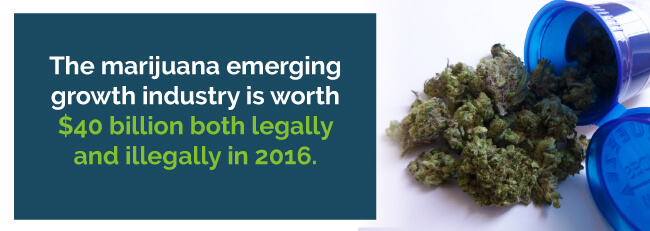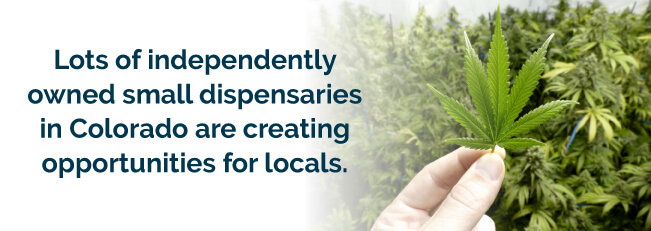
Once an illicit drug that conjured up images of free love and the hippie movement back in the ‘60s, marijuana is currently legalized for medical and recreational use in many U.S. states, although it’s still illegal at the federal level.
According to figures from independent investment finance bank Ackrell Capital, this emerging growth industry is worth $40 billion both legally and illegally in 2016. If the drug becomes federally legalized, the same report estimates the market will grow to $50 billion within the next 10 years.

Another report has projected that by 2020 the industry’s impact is likely to be worth $44 billion, not considering changes in decriminalization or legalization by the federal government or states.
It’s extremely rare for the U.S. economy to spawn a completely new industry, and medical marijuana could be the biggest business opportunity available since the inception of the internet. With this in mind, let’s examine what medical marijuana actually is and what new industries have developed as a result of its existence.
The efficacy of pot for medical use has become of increasingly more interest in recent years and in many parts of the world. You and many others may believe using the drug as a means to alleviate symptoms of a painful illness, rather than taking it to get high, can be very helpful if you’re suffering from chronic conditions such as cancer.
If you’re a medical cannabis advocate, you might believe in its benefit for treating chronic conditions, as it causes far fewer side effects than regular pharmaceuticals.

It’s important to be aware of the fact that you don’t need to smoke joints to get the benefit of cannabis. Many different parts of the plant can be used in a variety of ways, and can even be added into drinks as well as being consumed with food.
You can also buy cannabis capsules that are prepared under strict conditions and regulations by a government–recognized pharmaceutical company. So, if you’re wondering about the potential to abuse medical marijuana, the chances are limited, with the actual cannabis products going to people who genuinely need them.
According to the National Institute on Drug Abuse, due to scientific studies run on the cannabinoids within pot, there have been two FDA-approved medications that contain these chemicals made available to the public. Even so, the FDA has yet to approve or to recognize the cannabis plant as an actual medicine.
The two cannabinoids of interest in the marijuana plant are CBD and THC:
Pot is also considered by many to be beneficial for treating the following conditions and is currently undergoing trials to ascertain its effectiveness for:
With the above in mind, it’s no wonder there are many new industries and jobs being created because of the legalization of medical marijuana. Here, we look at the main ones that have been popping up all over the U.S.
A medical marijuana dispensary is a place permitted to legally sell medical marijuana, so long as the person buying it fits certain criteria that qualify them to possess the drug strictly for their own personal medical use. There is approximately $3 billion generated on an annual basis from dispensaries around the U.S., according to Bloomberg.

If you’re looking at owning one of these businesses, you’ll need to go through all the appropriate procedures and submit the correct paperwork to become legally licensed and permitted by the authorities in your region to sell medical pot.
If you’re a customer, you first need to consult with one of the marijuana doctors in your area to find out if you suffer from any medical condition that allows you to be treated with medical cannabis. It’s imperative you do this before going to any dispensary, as you’re going to need a prescription to get your pot.
If you’ve already seen a doctor and have your prescription but are unsure how to find a dispensary nearby, your doctor or a medical marijuana dispensary search can guide you in the right direction.
According to Bloomberg, from the beginning of January 2013 to the middle of April 2015, pharma/research held the biggest market capitalization of the legal marijuana market at $1.5 billion. Some of these businesses are responsible for research, whereas others produce medical marijuana or are investing in pot or hemp-based drugs to treat fibrotic diseases and pain.

The same Bloomberg report found medical cannabis producers, cultivators and growers had a market cap of $645 million from January 1, 2013, to April 15, 2015.

Have you ever heard how pot-loving vacationers flock to Amsterdam in Holland for all their cultural and dope-smoking needs? The concept of cannabis tourism being the newest travel-related industry is a real one. Colorado in particular is experiencing a boom in pot-friendly clubs and hotels now that laws have been relaxed.
In fact, people from all over the U.S. are traveling with new cannabis-focused tour operators, which are popping up all over the place. This type of tourism is particularly prevalent in both Washington and Colorado as the recreational buying and using of pot is legal in these states. But Nevada also has a growing industry. Here’s a look at two hot spots.
Medicinal pot has also been legal in Colorado since 2000, so there are lots of independently owned small dispensaries in the state creating opportunities for locals, as well as gaining some revenue from the tourist industry.

Even though there are a legion of tourists, both indigenous and from overseas flocking to Colorado, you aren’t allowed to smoke pot in public spaces, such as parks and streets, nor in places that can be seen from public spaces, such as the balcony of your hotel room.
You can get around this by booking in at a hotel that allows you to smoke both tobacco and weed, or you can smoke inside some of the local clubs. You can even sign up for a cannabis cooking class. With sales of pot in Colorado bringing in millions in tax revenue since the start of 2014, this is an industry that’s set to grow leaps and bounds the years ahead.
According to The Washington Post, there were 18,000 jobs created in the Colorado cannabis industry in 2015. Cannabis has offered opportunities for employers to start and maintain successful businesses. In addition, those employers need employees, therefore continuing the cycle of work.
Touted as the next recreational cannabis tourist center, Las Vegas is aiming to be the most frequently visited cannabis tourist spot on earth.
The city, which already boasts huge numbers of visitors from all over the world, is arguably the entertainment capital of the world. You go there to:
It’s a very decadent and exhilarating place where anything goes, and therefore Las Vegas goes hand-in-hand with cannabis tourism.
According to Travel Joint, in 2015 Nevada boasted 55 million visitors who spent in excess of $10 billion, and that was without the draw of cannabis.

The same site points out that Nevada is a reciprocity state. This means if you hold a medical marijuana card from any other state, you can easily buy pot. Even if you don’t hold a current medical card, the process isn’t much more difficult.
Another aspect of Las Vegas dispensaries you’ll notice immediately is that they’re high class. The Travel Joint points out that any prospective applicant hoping to open a dispensary needs to have at least $250,000 in liquid assets, and many of the individuals who made the grade have created dispensaries that offer private buying experiences and more.
Insurance is another medical cannabis growth area. All substances affect people in different ways. You might feel drunk after five or six drinks, and your friend could be out of their mind after only one. Pot effects can be similar, so it’s important for manufacturers and retailers to place adequate warning labels, including drug interactions, side effects and safe handling instructions, on their marijuana products.
If you’re in the pot business, it’s also imperative to insure your equipment and your product. You need to make sure all the above standards are in place and are correct. These are all areas where insurance experts are needed.
If you’re focused on your health and well-being, it’s likely you prefer to eat rather than smoke pot. This is one of the reasons why the edible marijuana industry is becoming so big. In fact, in 2014, there were approximately 4.8 million edible cannabis products sold in Colorado alone.

Of course, there are edible marijuana brownies. But today it’s possible to buy sodas, coffee and even popcorn that’s infused with pot oil, and this list will only grow as the industry continues to thrive over the years ahead.
One crucial aspect of the medical marijuana creation process is the companies that create hash oils to be used in various pot products.
The whole process of creating edibles begins in the extraction lab, where the pot plant nuggets are trimmed. From there, pure THC hash oil is created and can be added to any food product you can think of.
Although this industry has been on the go for many years, it’s only recently that it could be officially targeted toward hash users. With prohibition falling throughout the country, the selling of bongs, pipes, e-cigs and vaporizers for use in conjunction with marijuana products is expected to become big business as customers look for their preferred way to take the substance.
As pot use becomes more widespread, it stands to reason people will seek out more convenient options. Just like ordering a pizza for delivery, using a marijuana courier or delivery service is set to become the norm. Bearing in mind that many medical marijuana patients may not be physically able to get to the dispensary, home delivery is an attractive option for many people.
Pot delivery companies such as Eaze are springing up, and are easy and convenient to use:
Due to the nature of the sale of marijuana, maintaining adequate security is imperative to guard customer privacy and check IDs. In addition, it’s crucial to ensure money and product transfers go smoothly. Although security isn’t a new industry, it has a new focus in relation to medical marijuana sales. It’s also crucial to have adequate security anywhere pot is grown, as understandably these locations are a real draw to criminals looking for something for nothing.
In terms of the legalization of medical pot, there are so many ways regulation of this nature creates jobs. As we looked at earlier, marijuana is making many jobs, and these would once have been solely available on the illicit market. Through the process of government regulation, pot creates job for those in power as well as economic opportunities for people throughout the states where the drug is legal.
Another huge area of industry that’s recently been developing due to the upsurge in medical pot use is cannabis-based medicines. This includes the testing of various different cannabinoid compounds to treat different types of chronic pain.
An example of the success of such a company, as reported by The Scientist, is the first ever cannabinoid-based product, the oral spray Sativex became the first medicine in the world to be made from cannabis extracts and is approved to be used in more than 24 countries. The medicine recently finished Phase 3 clinical trials for treating both cancer pain and MS spasticity in the U.S.
The retail and medical marijuana marketing industry has created a whole new job opportunity. Known as budtenders, these medical or recreational cannabis dispensary workers are your first point of contact when you want to find out information on any marijuana products.
An interesting offshoot of the demand for budtenders nowadays is there are even courses emerging for prospective budtenders to learn all they could ever want and need to know about hash.
It used to be farming cannabis was something done illicitly and behind closed doors. Now, however, there is a huge medical cannabis business built up around the farming and harvesting of the plant. If cannabis is completely legalized on a nationwide basis, the industry could be worth as much as $100 billion by 2050, according to Ackrell Capital.

There are legal risks to cashing in on this booming industry. In fact, under the federal Controlled Substances Act, companies dealing in pot are conspiring to violate a federal law as well as aiding and abetting the use of cannabis. Having said this, the contradictions between state and federal-level laws make this a gray area.
You also need to take laws about money into consideration. If your business accepts money from any unlawful activity, you could find yourself guilty of a violation if you conceal the source of your money, which could be seen as money laundering. In states where medical marijuana isn’t regulated, there is a risk of prosecution. Thus, there is a growing market for consulting and legal advice if you’re involved in the medical cannabis business.
Perhaps a dream job in the industry is becoming a strain reviewer. There are various sites where you can read peer reviews, as well as those of experts that can be found through an online search.
Pot quality testing is another developing area in the cannabis industry, as this is something that requires regulation so customers know exactly what they’re buying.
In fact, according to The Denver Post, back in 2014, Colorado began mandatory testing of edible marijuana potency after there were two deaths linked to edibles that weren’t regulated or tested.
There are various safety recommendations as set out by the Drug Policy Alliance, which include:
Medical marijuana and job creation go hand-in-hand in today’s modern world and are poised to continue to grow over the years and decades ahead. Still an industry in its infancy, medical cannabis may have a great economic impact, as we discovered earlier.
With financial markets suffering a good deal of uncertainty in the past years, you might be asking whether medical marijuana and a healthy economy are linked. Looking at the huge list of new industries mentioned above, you should be certain this is indeed the case.
Pot is a substance many people swear by in terms of alleviating chronic and painful medical symptoms. Federal legalization in the U.S. is becoming more likely, as more states approve the drug.
With recent studies on animals illustrating that cannabis extracts can help reduce the size of some cancer cells and kill others, in addition to research in mice showing that cannabinoids used in conjunction with radiation increase its cancer-killing effects, medical marijuana could very well be the drug of choice for the future.
If you’re considering cannabis therapy to treat a medical condition, it’s best to search for and consult with a licensed physician for an evaluation and recommendation on a dispensary.
No Information on MarijuanaDoctors.Com should be used to diagnose, treat, prevent or cure any disease or condition. You can view our Full Disclaimer here.